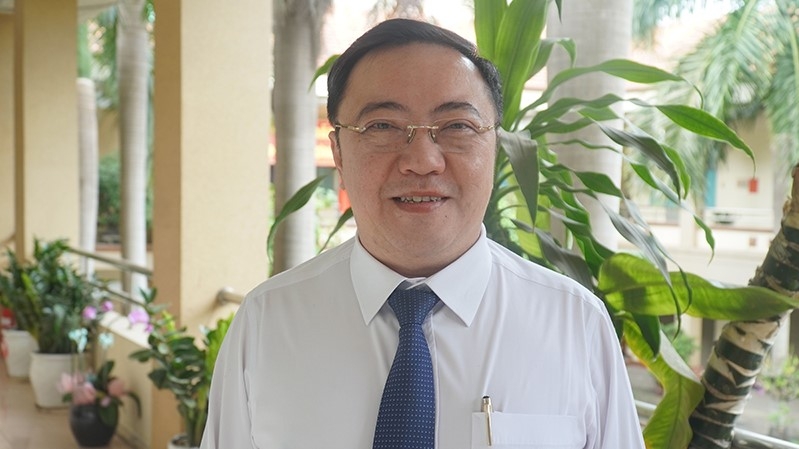
On the sidelines of the 13th National Party Congress, Dr. Phan Huy Anh Vu, Director of Dong Nai Department of Health granted Nhan Dan (People) Newspaper an interview on Vietnam's medical achievements in recent times.
On the sidelines of the 13th National Party Congress, Dr. Phan Huy Anh Vu, Director of Dong Nai Department of Health granted Nhan Dan (People) Newspaper an interview on Vietnam’s medical achievements in recent times.
 |
| Dr. Phan Huy Anh Vu, Director of Dong Nai Department of Health |
Q: The draft documents submitted to the 13th Congress outlining the social orientation in the country development for the period 2021 - 2030 mention the content "focusing on improving the quality of translation, health services, population quality and linking population with development". From the reality of your work locally, how do you assess our country's medical achievements over recent times?
Dr. Phan Huy Anh Vu: Continuing to renovate and perfect the health system of our country in the direction of equity, efficiency and development, especially at grassroots level, preventative medicine network; and ensuring the health of the people are an important policy of the Party and State. Increasing investment and innovation in the health sector will make an important contribution to the successful implementation of the country's goals in socio-economic development in the new period (2021 – 2030).
At present, population health indicators are at the same level or better than in countries with the same level of economic development. The preventative health system's achievements have significantly contributed to control control of dangerous diseases, such as: SARS, Influenza A virus subtype H5N1, and especially the Covid-19 pandemic, which is causing great damage to many countries around the world. We were one of the first four countries to have isolated the SARS-CoV-2 virus and the first to make a kit to detect the virus.
Medical examination and treatment have been integrated with many technologies, on a par with the rest of the region. In order to ensure sufficient supply of essential drugs for the people's medical examination and treatment needs; many units in the health sector have applied information technology to the management of minimizing the labor force, towards smart health. Human resources for health and the number of trained health workers have increased, of which the number of highly qualified doctors, pharmacists, nurses and medical technicians has been improved.
Major hospitals have successfully conducted many difficult and complicated cases such as twins, organ transplantation, and multiple organ transplants at the same time. The grassroots medical network, the system of hospitals, medical centres, and medical stations from central to local level has been paid attention to and is capable of meeting the health care needs of the people, improving the quality of examination, treatment and epidemic prevention. The State has adopted a policy of supporting the poor and vulnerable groups in medical examination and treatment.
In Dong Nai province, in the most recent term, all indicators in the field of health assigned by the Provincial Party Committee and Provincial People's Committee were achieved and exceeded. Health care services for the people were gradually improved, with modern technology that about 15 years ago was absent, such as coronary artery disease treatment, heart surgery and radiation therapy letters. Dong Nai is one of the leading localities in digitization, all medical stations now manage people's health records; all pharmacies and drugstores have software to manage the import and export of drugs. Notably, Dong Nai’s health sector has successfully implemented electronic medical records at Long Khanh General Hospital.
Q: According to you, what solutions need to be taken to improve the health sector's capacity to meet the requirements of national industrialization and modernization in the coming time?
Dr. Phan Huy Anh Vu: In order to improve the capacity of the health sector, to meet the requirements of national industrialization and modernization in the coming time, I think it is necessary to strengthen the leadership of the Party and government, and promote the participation of socio-political associations in the protection, care and improvement of the people's health. It is necessary to improve the effectiveness of epidemic prevention and control, and promptly respond to emergency situations. It is necessary to ensure sufficient vaccines for all.
At the same time, it is necessary to continue to consolidate the organization, network and equipment for the preventative medicine system, ensuring that preventative medicine facilities are qualified and capable of performing their professional tasks, meeting and responding to disease prevention requirements for the people. It is necessary to improve the quality of medical examination and treatment, to basically overcome the hospital overload.
In addition, it is necessary to continue to renovate and consolidate the medical network, perfect the system of medical organizations from central to local level in the direction of streamlining effectiveness, efficiency and international integration. It is necessary to increase investment and accelerate the process of restructuring the state budget in the health sector in order to have the resources to comprehensively implement the protection, care and improvement of the people's health, especially in remote areas.
In particular, we need to pay attention to training a team of health workers with an excellent work ethic in all fields, paying attention to the grassroots medical teams in particular. In reality, our grassroots health remuneration is still low, not strong enough to motivate, develop and specialize sufficiently in terms of our grassroots health human resources. Currently, the number of doctors per capita compared to the world average is still low, so it is necessary to continue to have high-quality medical universities to train and promptly supplement the number of doctors in the near future.
(Source:Nhan Dan)





